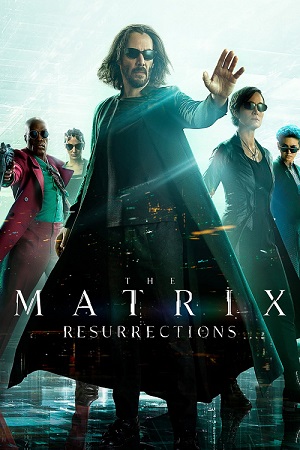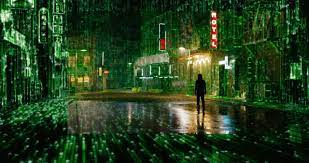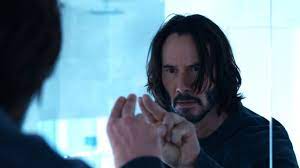Movies /
Movie Reviews
The Matrix Resurrections: A Meta-Masterpiece
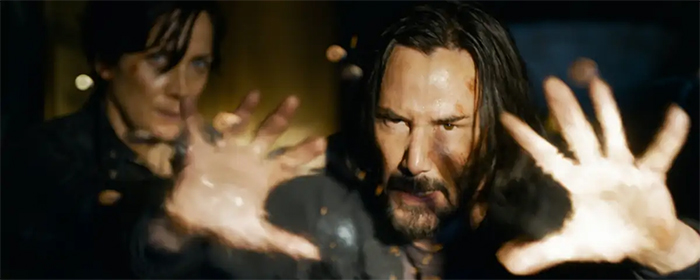
By Andy Frisk
December 23, 2021 - 18:41
The Matrix Resurrections: A Meta Masterpiece
“What is real?” asked Laurence Fishburne as the Morpheus over 20 years ago in the 1st film of what appears to be a new franchise that will grow beyond its original trilogy. To me, the reality is that while many people hated the sequels to
The Matrix (1999), I adored every moment of them. The heavy philosophical dialogue and the revelation that the religious aspects of the film such as Neo as a Christ figure being revealed to be just another level of intellectual and mental matrix of control implemented by the machines turned off many viewers. These kinds of plot twists and heavy philosophical dialogue along with the then mind blowing special effects, and all the kung fu I could handle (and I can handle a lot), endeared me to
The Matrix sequels. They have become part of my pop-philosophical inner matrix of thought. I once had a professor in college who could relate everything in his lectures, experiences, and life back to
The Wizard of Oz, often with humor and insight. For me,
The Matrix Trilogy is that movie. The question arises though, why mess with a masterpiece? What could possibly be added to such a complete and well rounded story? As it turns out, and as Smith observes in the movie, “That’s the thing about stories, they never really end.” With this observation we begin the descent down a new yet familiar rabbit hole of themes that include metafiction, nostalgia, choice, and free will that is surprisingly fresh and advances the grand narrative that has become
The Matrix franchise of stories.
Why Mess With a Masterpiece?
Now that we’ve gotten that out of the way, and if you’re still with me, I have to admit that when I heard that Lana Wachowski was returning to the world that she co-created with her sibling, I wasn’t happy. The original story was well contained within its three film story arc. We met Thomas Anderson, savior of both man and machine kind, saw him die and come back only to make the ultimate sacrifice and enlighten us along the way as to the nature of the divinity in all of us and the true nature of our reality. Not to mention his showing us, along the way, what we can achieve when we “free our minds.” That’s what I got out of it. You probably got something different, and that’s okay. In fact, that’s the point. Movies like
The Matrix inspire us to be seekers. We uncover our own truths and sometimes, quite by accident, ourselves through the moving images and words. Moving images and words constructed by an artist who is motivated solely by their own personal desire to explore what’s been bugging them while graciously inviting us along their personal journey of exploration with their art. Sometimes though, a work of art is meant to have a beginning and an end. There’s no Second Coming on the horizon as far as we can see, so why does Neo get one?
Building Upon a Masterpiece
As the old cliche goes though, “fortune favors the bold,” but too often the bold end up being “fortune’s fool.” The latter is not the case this time out for Lana Wachowski and crew.
The Matrix Resurrections is bold, brilliant, and, not as surprising as one might think, FUNNY. Let’s harbor no illusions about one aspect of the original trilogy: it certainly wasn’t funny. The Matrix Resurrections gleans its humor from a few specific themes: metafiction, nostalgia, choice, and free-will (yeah, those again).
Before we get into those important themes, it’s worth a look at all the other themes and philosophical ideas it tackles. This flick will keep the scholars busy writing papers for decades, much like the originals did. Along with the aforementioned themes it addresses: attraction, cooperation and binary interaction (the new human city is named “IO” or my slyly identified as 1 and 0), the nature of reality, age and aging, self-discovery, self-reflection/identification, patriarchy, women’s role in society, the divine feminine, geek culture, love, mid-life crises, what makes us human and divine, and, of course, technology and its benefits and hindrances based upon who is driving the narrative. It also touches on war, peace, the dichotomy of good and evil as well as the nature of what it is that defines sentience.
Whew! Yeah, it’s a thoroughly engaging film, intellectually as well as visually. That’s a rare thing for a Hollywood blockbuster these days. With The Matrix franchise though, this has become the expectation. Once audiences saw Neo flying in
The Matrix Reloaded, there was no doubt that the special effects tech that allowed Neo to fly, and dodge bullets, would lead to a big screen rebirth of Superman and a whole universe of Marvel Superheros. Our entire age of stupendous superhero driven films owes its direct existence to the original
Matrix Trilogy, in a visual way if nothing else. The MCU films are visual children of
The Matrix, and are often intelligent and inspiring, but none of them hold a candle to the gravitas of themes
The Matrix movies revel in. I’m not saying they should, but
The Matrix films are, and must always be, a thinking man’s Star Wars or Avengers. The evolution of Tony Stark from billionaire weapons dealer to self sacrificing savior of the universe is an inspiring story, no doubt. There is very little by way of a deep dive into the nature of reality and the role of women in a culturally dominated patriarchy, for example, in any of the films. Black Widow touched upon that theme, but nowhere as intricately as Wachowski explores Trinity’s return to heroism and self actualization in
The Matrix Resurrections.
A Look Into a Few of The Themes in The Matrix Resurrections’ Story
The Matrix Resurrections (and here come some mild spoilers so be forewarned), opens with Thomas Anderson/Neo (Keanu Reeves) living in a self sustained and retooled Matrix (which was created by his ultimate sacrifice at the end of The Matrix Revolutions-albeit still policed by “the suits” or Agents) as an award winning game developer who’s crowning achievement is The Matrix Trilogy of video games. He’s completed his trilogy, and (here’s where the metafiction and humor come in) he has no intention of coming up with another trilogy for what he believes is the taunt and tidy telling of the story he created (but unknown to him at this point, actually lived). The only problem is that his business partner (a rebooted version of an old nemesis) has orders from on (corporate) high that “Warner Brothers” is demanding a sequel. Thus begins a wonderful tunneling down a delightful rabbit hole of self-referential jokes and storytelling that heretofore has been unseen in any mega movie franchise. The sheer boldness of Wachowski to cast the whole original trilogy as a mega selling video game franchise created by The One himself while he is living in yet another version of a simulated world that is in a sense his own next-next life where he has to once again wake up is a stroke of genius. It's a genius level commentary on Wachowski’s own existence as a creator willing to return to her crowning achievement and find a way to make it, not only relevant again, but new and exciting while breathing new life into what was already an intellectually lively piece of artful filmmaking and storytelling.
Enter the captain of The Mnemosyne, Bugs (Jessica Henwick), a Morpheus-like seeker of The One, who this time continues to exist, but is even harder to find due to the machines hiding him. Once found and awoken, Neo embarks upon a more personal quest this time. This leads to all sorts of new developments that won’t be spoiled here. Ultimately though, they will involve Trinity, who is living (again) this time as Tiffany (“Everyone calls me Tiff”), unaware of who she really is. Here is where The Matrix Resurrections morphs into a brilliant and beautiful love story that incorporates all the deep philosophy and social commentary we expect, but serves as an inversion of the first trilogy’s story that focused on the philosophy first and drug the love story along with it. It makes perfect sense though to put the philosophy of love first this time out, for what drives all philosophy at its heart? What makes a story worth telling and retelling? Living and reliving? Yes, the Hero’s Journey can drive important stories (and it does here too-although the Hero isn’t necessarily who you think it is), but a major part of that Journey is the journey towards completion, spiritual, physical, and otherwise. This completion of being is one that only love for another (be it a friend, a companion, another consciousness, or a binary or non-binary physical partner-or if you’re really lucky a combination of several of the above) can deliver.
This journey is nearly thwarted by The Analyst (Neil Patrick Harris) who, as a sort of retooled version of The Architect, has nefarious designs on this new Matrix and keeping Neo and Trinity locked in their current situations is a must as an end to his designs. Harris’ brilliant turn as a therapist gone bad is loaded with its own insight and commentary that warrants its own further investigation. Throw in another version of Neo’s old nemesis, or rather flip-side, Smith (Jonathan Groff), and the story, with its meta-fictional humor established, turns into a glorious joy ride of old fashioned Matrix franchise style mayhem. Here’s where the effects driven part of the film takes over. While the fights and flights of cars, people, motorcycles, and trains (yes, trains) are spectacular, there really isn’t anything new under the Matrix sun here. With the past near two decades of superhero super-effects, it’s no longer as eye-popping to watch Neo and crew kung fu and wall run their way around bullets and blades as it once was. It is still a whole lot of fun though. The effects, like the philosophy, this time out are designed to fuel the love story and not vice versa. Something that will endear this film to the casual audience in ways that the two sequels to the original didn’t.
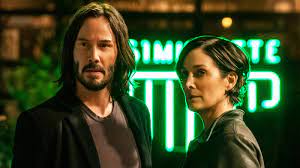 |
In Summation: Plug In Baby…Repeatedly
At this point, you are probably wondering where the review of the film is in all this dialogue about said film’s themes. Unfortunately,
The Matrix Resurrections can’t be told, it has to be seen. If you were a fan of the original, or if you’re that special someone who liked the sequels as well, then you will love what you will see. This new Matrix movie isn’t just an homage to its past, it is a pulling down of that special energy that is The Matrix as a concept and using it to conjure brilliant storytelling. The Matrix Resurrections deserves repeated plugging into. You won’t be disappointed.
Rating: 9 /10
Last Updated: January 17, 2025 - 08:20

